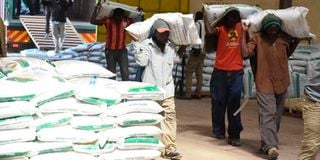Premium
Farmers feel the pinch of costly fertiliser and fuel

Workers offload a subsidised fertiliser consignment from a truck at the National Cereals and Produce Board, Eldoret depot in Uasin Gishu County.
What you need to know:
- Many of the farmers might be forced to plant without fertiliser if the distribution is not stepped up.
- Fertiliser prices reached a record high of ShSh6,200 up from Sh3,000 per a 50kg bag in the open market.
Cereal farmers will have to grapple with high production costs due to delayed procurement of cheap government fertiliser and acute fuel shortage.
This has made it hard for farmers to obtain the farm input and plant as the planting exercise starts in most parts of the North Rift region.
Most National Cereals and Produce Board (NCPB) warehouses in the region received one lorry loaded with 560 bags of fertiliser, which cannot meet the needs of the high number of farmers who have registered to benefit from the low-cost fertiliser.
“We are faced with a serious crisis that the government needs to resolve in the distribution of the inputs to avoid inconveniencing farmers. The quantity of fertiliser being delivered at the NCPB depots is too low to meet the increasing demand by the farmers,” said Kipkorir Menjo, a Kenya Farmers Association director.
A senior board official attributed the problem to slow procurement but expressed optimism that the issue will soon be resolved.
Small-scale farmers in the region want the distribution strategy reviewed, saying they are not benefiting from the programme.
Low cost fertiliser
“The unscrupulous agriculture officials collude with cartels by registering as farmers and approve subsidised fertiliser in large quantities, causing artificial shortages,” said David Kosgey from Soy, Uasin Gishu County.
“The government should have availed the low cost fertiliser early enough for proper planning,” said Jackson Kosgei from Moiben.
Agriculture Cabinet Secretary Peter Munya announced the availability of low cost fertiliser after it set aside Sh5.6 billion to subsidise the farm input, cutting the price from Sh6,200 to Sh2,800. But the farmers want the government to ensure that only genuine farmers benefit from the subsidy.
“Agriculture officials and local administrators need to be involved ito weed out cartels,” said Mr Menjo.
Many of the farmers might be forced to plant without fertiliser if the distribution is not stepped up.
Fertiliser prices reached a record high of ShSh6,200 up from Sh3,000 per a 50kg bag in the open market amid short supply by leading producers such as China, which announced the suspension of exports to boost domestic availability.
China, the world’s top exporter of phosphate, said it would suspend exports until June. This even as global demand for the commodity outstrips supply occasioned by decline in supply of raw materials.
Increased fuel prices
According to the latest World Bank fertiliser price index report, high energy costs coupled by high natural gas and coal prices have pushed up the cost of fertiliser. Global environmental regulations have also pushed up prices of sulphur and ammonia, which are used to manufacture fertiliser.
“The fertiliser prices will remain volatile due to global market forces of supply and demand, which might force some farmers to plant without the nutrients,” said Henry Ogola, who deals with in importation of farm inputs.
The increase in fuel prices is also bound to hurt the agriculture sector. Farmers yesterday termed the increase in diesel prices a major setback as this adds to the high cost of land preparation and crop management.
“Cultivation of crops such as maize and wheat is mechanised and increased fuel prices will push up the overall operating costs,” said Matthew Koech from Saos in Nandi County.
A litre of diesel is currently selling at an average of Sh126 in the North Rift region, up from about Sh117.
“Diesel is the strength of our crop production and the government needs to regulate the prices to safeguard us from other operating costs like maintenance of our tractors in order to make agriculture a profitable venture,” said Miriam Too, from Cherang’any in Trans Nzoia County.





